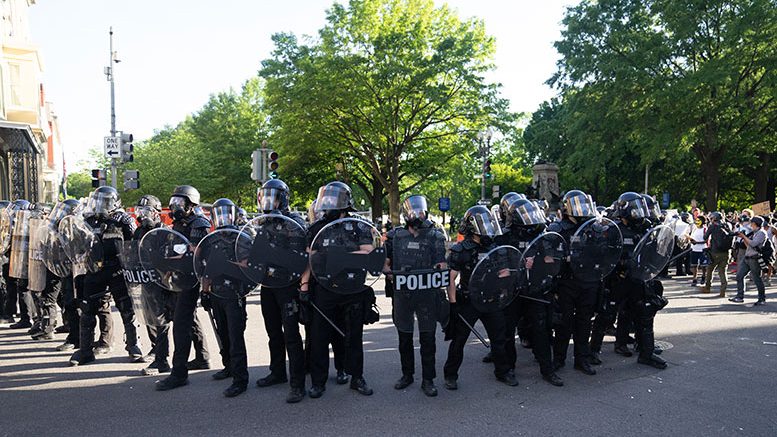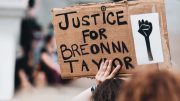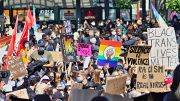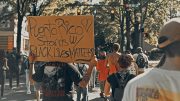Qualified Immunity, Excessive police force and brutality hide behind a doctrine that is rooted in white supremacy, devalues PoC lives
By: Audrey Cole/Reporter—
What began as a pulmonary-related hospitalization abruptly ended a patient’s life after a struggle with police in an Oklahoma hospital’s hall.
His name was Johnny Leija. He was a Latinx man.
Leija, hospitalized for pneumonia was confused and agitated as he paced the hospital’s hall, Reuters reported. When he refused to go back to his room, the officers shot Leija with a stun gun and proceeded to “follow him down a corridor, shocked him again, and wrestled him to the floor,” the report found, which was also corroborated by the hospital’s video surveillance. “One officer then straddled Leija’s back, tried to handcuff him as the others struggled to pull back his arms. They get one handcuff on. Leija [went] limp …”
According to the state’s Chief Medical Examiner, Leija died that day from “respiratory insufficiency” as his lungs were already compromised from his illness and he was starved for oxygen in his struggle with police.
The three officer’s involved were not held accountable due to qualified immunity, a judicially-created doctrine of the U.S. Supreme Court meant to protect the police and government employees from frivolous lawsuits. Since its creation, 50 years ago, it has turned into a “highly effective shield in thousands of lawsuits seeking to hold cops accountable when they are accused of using excessive force,” the Reuters’ report stated.
According to the Institute for Justice, Qualified Immunity means that government officials, including the police, “cannot be held accountable for violating the Constitution unless they violate a ‘clearly established’ constitutional rule,” its website read.
“In practice, that means that government officials can only be held liable if a federal court of appeals or the U.S. Supreme Court has already held that someone violated the Constitution by engaging in precisely the same conduct under precisely the same circumstances.”
“… Qualified immunity (QI) is at the root of systemic racism,” said Tachou Dubuisson, Co-founder of the North Shore Mass. NAACP Branch.
Adding insult to injury, the doctrine makes a nearly impenetrable wall for precedent of “clearly established” law.
“Under 42 U.S.C. § 1983 when a court determines that the illegality of an official’s conduct is not ‘clearly established,’ the court can dismiss the suit without determining whether that conduct actually violated the law,” according to the Constitutional Accountability Center. “This means that the next time an official harms someone through the same conduct, there will still be no clearly established law for the victim to rely on—and it will still be impossible to hold anyone liable for violating the Constitution.”
If no exactly similar cases can be cited, in other words, people suing the police will not see justice.
Overturning Immunity
Politicians like Rep. Justin Amash (L-Mich.), U.S. Sen. Cory Booker (D-NJ)and multiple advocacy groups have announced that they will introduce bills to eliminate or reform qualified immunity, the Washington Post reported.
Locally, Congresswoman Ayanna Pressley (D-Mass.) and Boston City Councilor Ricardo Arroyo penned a joint Op-Ed to the Boston Globe, later released to other media, denouncing the use of Qualified Immunity to avoid accountability of inappropriate police conduct.
“For every profession, there are standards of conduct—and consequences when they are broken,” the op-ed read. “Doctors can be sued for malpractice, lawyers for negligence. Police should be no exception. For too long, qualified immunity has protected the very people charged with upholding and enforcing the law from any consequence for breaking it. Even in the most egregious cases of police brutality, this Supreme Court-invented doctrine has allowed officers to use their badge as a shield from accountability.”
Qualified Immunity and the KKK
The Congresswoman and Councilor explained how Qualified Immunity goes hand-in-hand with the protection of and abuses against marginalized communities, particularly the black community.
“The history of civil rights abuses and the establishment of qualified immunity in the United States are inextricably linked,” the release read. “The right to sue state and local officials—including police officers—for civil rights violations was initially established in 1871 to protect Black people experiencing backlash to the rights recently granted under the 14th Amendment. In fact, the tether between the need for accountability when a government official claims a person’s life and white supremacy was so strong that the bill establishing this right, the Civil Rights Act of 1871, was commonly referred to as the ‘Ku Klux Klan Act.’ The law aimed to curtail the rampant white supremacist violence against Black people for simply existing and exercising their rights in the Reconstruction South.”
Deviating from its initial intent, Qualified Immunity eventually became the tool to strip away those very rights and protections as it was seemingly warped from its original purpose.
“After inventing the doctrine of qualified immunity in 1967, the Supreme Court issued several decisions expanding this protection,” Pressley and Arroyo wrote. “Since 2005, courts have increasingly ruled in favor of police in excessive use of force cases, a trend that has only accelerated in recent years.”
Racial Profiling
Excessive use of force and police brutality overwhelmingly impacts people of color, especially black men who are approximately three times as likely to be killed by police, Pressley and Arroyo also noted.
“… We know that this is a matter of racial justice—past and present,” they said.
In addition, Dubuisson said that Qualified Immunity also exacerbates racial profiling.
“QI allows the government to standby corrupt police officers who continuously use excessive and avoidable force on Black lives [in comparison to] White lives,” said NAACP’s Dubuisson. “[It] has been abused by law enforcement agencies for far too long against Black lives [and is the] main reason [that] there are no real life-changing consequences against officers who are accused of racial profiling.”
According to Dubuisson, the doctrine is also about sowing power and division amongst white and black lives from the police to public opinion, and politics revolving around systemic racism.
“Qualified Immunity is a created disease used to weaken the value of Black lives and give power to White lives,” she said. “When this is evident, the division is clear. I have been reading lately from many Trump supporters, [that] they believe a Black civilian shouldn’t run away [even] unarmed or have a record when confronted by police or the murder is justified. When White people witness this power given to police who look like them, they learn and adopt white supremacy. White people have to suffer real consequences for taking a Black life when the situation clearly offers alternatives—alternatives, such as not kneeling on George Floyd’s neck for almost 9 minutes. QI hurts Black people because it takes away our civil right to be valued as a human life.”
Qualified Immunity & Complicity
Hema Sarang-Sieminski, Policy Director of Jane Doe Inc., a statewide Massachusetts-based coalition of 57 member programs that provides services and support to survivors of sexual and domestic violence (SDV), focused on how Qualified Immunity impacts the needs of survivors.
“We know that the criminal legal system was never designed to meet all of the needs of survivors of SDV,” they said. “The murders of Breonna Taylor, George Floyd, Ahmaud Arbery, Tony McDade, Dion Johnson and so many others compel each of us to act and lead in ways that affirm that #BlackLivesMatter.
“For many of us, this has meant reflecting on our own complicity in a culture that supports white supremacy—how we have benefited, where we have remained silent, and where we can do more to intervene and interrupt racist harm. It has also meant witnessing, acknowledging, and understanding oppression, as it exists in policing practices and our criminal legal system.”
As for the court of public opinion, it largely rules on the side of ending Qualified Immunity.
“Two-thirds of Americans say that people need to be able to sue police officers to hold them accountable for misconduct and excessive use of force—even if it makes officers’ jobs more difficult,” said Sarang-Sieminski. “Ending qualified immunity would mean challenging the message that powerful state actors can violate people’s rights without consequence. Against the barrage of macro- and micro–aggressions that are the daily lived reality for Black folks in this country, an end to qualified immunity is one step towards shifting our culture towards one that affirms that #BlackLivesMatter.”
Massachusetts is Not Immune
“Qualified immunity allows many types of government illegality to go unchecked, but its effects are especially pernicious when it comes to unjustified shootings and other abuses committed by police officers,” read the Constitutional Accountability Center’s (CAC) website.
In Massachusetts, Wilfredo Justiniano was killed at the hands of police in 2015 after a driver reported a man “who seemed to be distraught,” read Pressley and Arroyo’s release. “Upon the officer’s arrival, Justiniano, who had a history of mental illness, was “yelling and jumping up and down” and approached the officer with a ballpoint pen. The officer proceeded to pepper spray Justiniano twice before shooting and ultimately killing him.”
According to Pressley and Arroyo, his family “filed a suit against state trooper Stephen Walker for excessive force and wrongful death.”
However, citing qualified immunity, the judge dismissed the case, thereby negating any legal precedent for future cases as well.
“These types of incidents involve a myriad of factual variations, making it extremely difficult for victims to identify a previous case involving the exact same scenario,” according to the CAC. “The result is a nearly impenetrable barrier to recovery for people who are harmed without justification during police encounters …”
With no accountability, there is no justice.
“At its most basic, qualified immunity denies victims of police brutality an opportunity to hold policing systems accountable in meaningful ways,” added Sarang-Sieminski. “It denies them their day in court and their right to be compensated for the harm they and/or their families suffered on account of police misconduct.”
“Clearly established” Law
As courts and judges dismiss cases while citing Qualified Immunity as a defense, the cycle continues—police misconduct followed by no court ruling on the misconduct, which fails to set a “clearly established” legal precedent of such actions taken by an officer.
“When a court determines that the illegality of an official’s conduct is not ‘clearly established,’ the court can dismiss the suit without determining whether that conduct actually violated the law,” the CAC wrote. “This means that the next time an official harms someone through the same conduct, there will still be no ‘clearly established’ law for the victim to rely on—and it will still be impossible to hold anyone liable for violating the Constitution.”
Accountability doesn’t only end with the officers but municipalities and states also play a critical role.
“… Because states and localities rarely have to shell out money in damages for the actions of their law enforcement officers, they have little financial incentive to institute the kinds of trainings and policies that might prevent unnecessary shootings and other incidents of excessive force,” explained the CAC’s site. “As [Supreme Court] Justice Sonia Sotomayor put it in a dissent, qualified immunity has become ‘an absolute shield for law enforcement officers, gutting the deterrent effect of the Fourth Amendment.’”
If there is no accountability, police reform means little.
“Reforms to criminal legal systems are largely meaningless if officers, and the police departments who employ them, don’t have to answer to the people they’ve hurt,” Sarang-Sieminski said.
Get It Done
Politicians like Pressley and Amash and states across the country are examining ways to deconstruct Qualified Immunity and it has already been done, proving it possible.
“In response to the inexcusable and willful acts of police misconduct, policy makers at all levels of government are exploring ways to finally bring an end to qualified immunity,” wrote Pressley and Arroyo.
Federally, Rep. Pressley and Rep. Justin Amash are working to dismantle the doctrine.
“The Representatives have introduced the ‘Ending Qualified Immunity Act,’ which would ensure that police officers engaging in police brutality are not shielded from accountability,” read the Op-Ed by Pressley and Arroyo. “At the state level, Colorado became the first in the nation to eliminate this doctrine.”
Both Pressley and Arroyo hope the Commonwealth follows suit.
“The Commonwealth has an opportunity to stand on the right side of history by ensuring that those enforcing the law are subject to it, too,” the release read. “There can be no justice without healing and accountability, and there can be no true accountability with qualified immunity.”
Both the Massachusetts House and Senate have passed a version of a police reform bill that also touches on Qualified Immunity. To date, a bill has not yet reached the Governor’s desk, as both branches of the legislature have not yet come to an agreement on the final bill.
Although the House bill went “slightly further than the Senate bill on the use of force and had stronger regulations on the use of facial surveillance, it barely touched the issue of qualified immunity … Neither bill goes as far as necessary to truly limit the scope of policing, i.e., shifting functions away from police departments and to trained social workers and other non-armed professionals,” Progressive Massachusetts, wrote on its website. We don’t need armed police to show up when someone has a mental health episode.”
Now is time to seize the moment.
“The need to eliminate qualified immunity is clear and, in this moment of national reckoning, lawmakers should show the political courage to finally get it done,” said Pressley and Arroyo.
As for Leija, and countless others, despite his family’s attempt to hold the officers accountable, the court ultimately found that the circumstances were “not similar enough,” to a previous case, resulting in the police officers being protected by Qualified Immunity.
“My son wasn’t a criminal, my son was sick,” Leija’s mother said in an interview reported by multiple news outlets.
To view how members of the Massachusetts Legislature voted on each part of the police reform bill, visit https://bit.ly/35px5i2.







